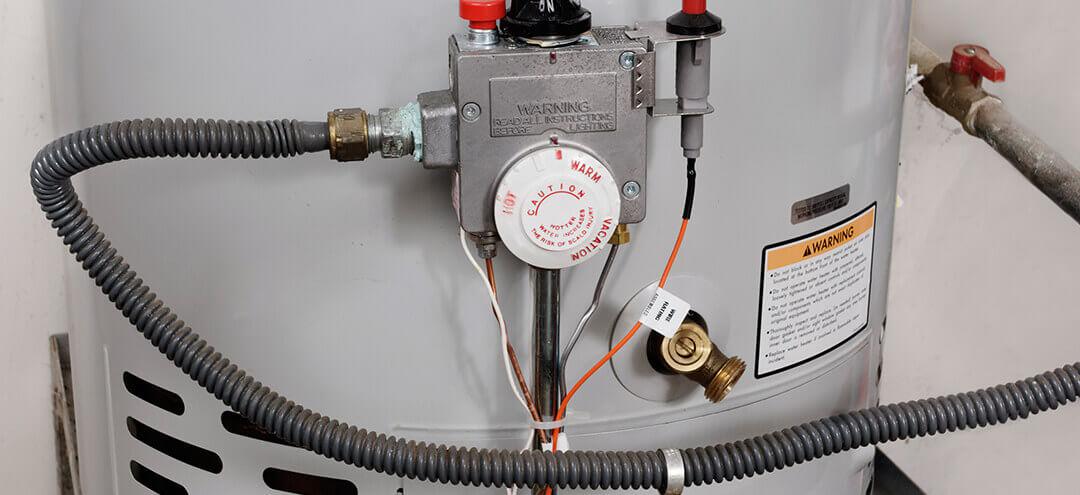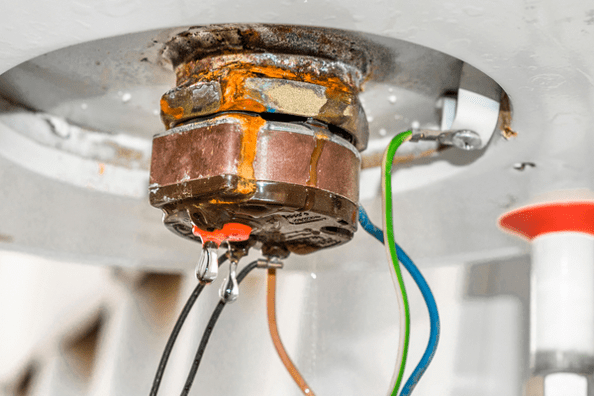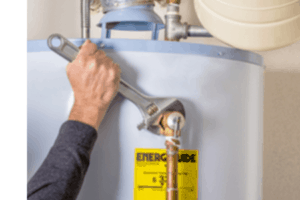
If you hear dripping inside your water heater or see signs of water accumulation on or underneath it, start checking for leaks right away. Water heaters usually leak from three places: the supply pipes, pressure relief valve, and drain valve. Check these places first and work your way out.
The faster you find your water heater leak, the less damage it will inflict on your heater, your plumbing system at large, and your water bill. If you ever suspect you have a water heater leak, follow these steps right away:

How to Check for a Leaking Water Heater
Water heaters contain many parts and connections. Any number of these are susceptible to wear and leaks. Leaky pipes or valves are simple to fix without replacing the entire water heater. A tank that is leaking water is a more serious issue and could warrant calling a licensed plumber.
Here’s what to look for:
- Water supply pipes. At the top of your water heater you’ll find two pipes. One is the cold water supply. The other is the hot water out. Check the area where these pipes connect to the heater for signs of moisture. You should also check the pipes and threads above. In some cases, water can drip down pipes and over the water heater tank, making it confusing to identify the leak’s source. Simply tightening loose connections may fix your leak.
- Pressure relief valve. This is a small valve at the top of your water heater. It regulates the water pressure and temperature inside the heater. If the internal spring wears out, it could start a slow and steady leak. Luckily, these springs are inexpensive and easy to replace. In extreme cases, if a pressure valve is faulty and the heater becomes too hot, it may explode. Water should never be pouring from this valve. If your water heater is whistling or rattling, it means pressure is built up inside and steam is trying to escape.
- Drain valve. This valve at the bottom of the heater is used to drain the water and empty the tank. Use your finger to check inside and around the valve for signs of moisture. If you discover water dripping here, a simple garden hose cap can cover the leak until you can install a replacement valve. If you need to drain your tank, connect a garden hose and direct the water to a floor drain.
Gas vs. Electric Water Heater Leaking
The type of water heater you have may affect where your leak is coming from.
Electric water heater leaking may come from behind the access panel. Be careful: wet electric water heater components or insulation are an electric shock hazard. Make sure you shut off the electricity at your circuit box before you check for leaks! After you’ve turned the power off, remove the access panel and safety shield and check for moisture inside. Tighten any loose bolts while you’re at it.
Gas Water heaters have a flue the entire length of the heater in the center that vents carbon dioxide from the burner. Look for water leaking on the burner at the bottom of the tank. If you find any, then your flue is the source of the leak. Unfortunately, you’ll have to replace the entire water heater.
What Do I Do If I Find Water Heater Leaking?

The first thing you should do is shut off the water supply to your tank to keep it from leaking any more. You’ll find the shut off valve on the cold-water supply pipe just above the heater. If you have an electric heater, turn off the power supply at the breaker. If you have a gas heater, turn the gas shut-off dial.
You may be able to easily tighten or drain the heater and replace the part in question if you find the leak at any of the pipes or valves mentioned above.
When Should I Replace My Water Heater?
Sediment and rust build up over time and eventually corrode the interior of your water heater tank. It may be time for a replacement if you notice any of the following signs of tank corrosion:
- Leaking from the bottom of the tank
- Dripping sounds from within the tank
- Water pooled on the floor
- Wet insulation
Once the tank is compromised, you’ll need to replace your water heater.
What Are the Benefits of a New Water Heater?
A new energy efficient water heater can save you money on your utility bills, add value to your home, and ensure that you don’t run out of hot water. Replace that old heater and benefit with:
- Worry-free hot water for 10-12 years.
- A thermometer that keeps your showers hot until the end.
- A larger tank that meets the needs of a growing family.
- A quiet model that won’t rattle.
- Higher efficiency and reduced water costs.
If your tank is solid and your heater still works you may not be considering replacement. There are a few steps you can take to extend your water heater’s life until that time comes.
Get Expert Water Heater Leaking Repair in the Dallas Area
Water heater leaks can be a sign of bigger problems. Trust one of our certified technicians to diagnose your hot water woes. We do it all, from simple valve repairs to full water heater replacement. Call us today for quick solutions to your plumbing needs.
